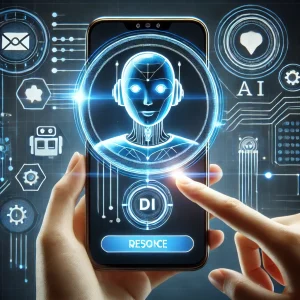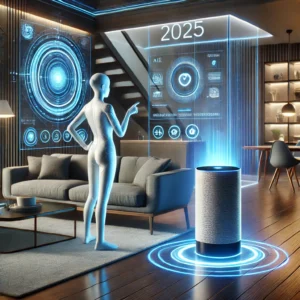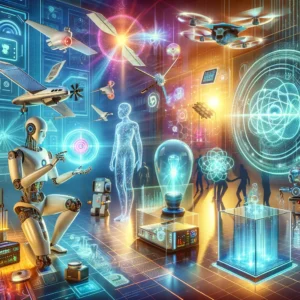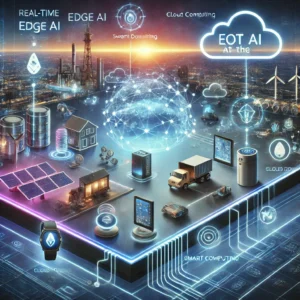Exploring the Potential of AI-Powered Chatbots

Exploring the Potential of AI-Powered Chatbots.
Artificial intelligence (AI) has revolutionized many industries, and one of its most transformative innovations is AI-powered chatbots. These intelligent conversational agents are reshaping how businesses interact with customers, automate processes, and enhance overall efficiency. In this article, we’ll explore the potential of AI-powered chatbots, their real-world applications, benefits, and how they are poised to shape the future.
—
What Are AI-Powered Chatbots?
AI-powered chatbots are software applications designed to simulate human-like conversations using natural language processing (NLP), machine learning (ML), and sometimes deep learning technologies. Unlike traditional chatbots that follow scripted responses, AI chatbots can understand user intent, context, and provide tailored responses.
Examples of Popular AI-Powered Chatbots:
ChatGPT by OpenAI: A conversational AI tool that excels in human-like responses.
Google Assistant: A chatbot with advanced voice recognition capabilities.
Siri by Apple: AI assistance for mobile and smart devices.
READ ALSO: Is the Future of Gaming Cloud-Based?
—
Trending Applications of AI Chatbots
1. Customer Service
Businesses use AI chatbots to handle customer queries 24/7, providing instant responses and reducing wait times. Chatbots can resolve common issues, offer product recommendations, and even process transactions.
Target Keywords:
AI customer service solutions
Chatbots for e-commerce
2. Healthcare Assistance
AI chatbots are revolutionizing healthcare by offering appointment scheduling, symptom checking, and personalized wellness tips. For instance, apps like Babylon Health use chatbots to streamline patient care.
Target Keywords:
AI healthcare tools
Chatbots in telemedicine
3. Education and E-Learning
Virtual tutors powered by AI help students learn efficiently. They offer tailored assistance, answer questions, and provide resources for further study.
Target Keywords:
AI chatbots for learning
Education technology trends
4. Financial Services
From tracking expenses to offering investment advice, AI chatbots like Cleo are making financial management accessible to all.
Target Keywords:
AI in banking
Fintech chatbot solutions
—
Advantages of AI-Powered Chatbots
1. Cost Efficiency
Automating customer support reduces the need for large call center teams, significantly cutting operational costs.
2. Personalization
AI chatbots analyze user data to provide personalized recommendations, improving customer satisfaction and loyalty.
3. Scalability
AI chatbots can handle thousands of interactions simultaneously, making them ideal for businesses of all sizes.
4. 24/7 Availability
Unlike human agents, chatbots work round the clock, ensuring continuous customer support.
5. Data Insights
Chatbots gather valuable customer data, which businesses can use to refine their strategies and improve services.
—
Challenges and Limitations
1. Understanding Complex Queries
AI chatbots may struggle with nuanced or highly complex questions, leading to customer frustration.
2. Integration Issues
Integrating chatbots with existing systems can be challenging for businesses without technical expertise.
3. Data Privacy Concerns
Since chatbots handle sensitive information, ensuring robust data security measures is essential.
—
The Future of AI-Powered Chatbots
The future of AI chatbots looks promising, driven by advancements in NLP, ML, and contextual AI. Trends like voice-enabled bots, multilingual capabilities, and emotion detection will enhance user experiences further.
Emerging Trends:
Voice AI: Chatbots capable of engaging in seamless voice conversations.
Omnichannel Support: Integration across platforms like WhatsApp, Facebook Messenger, and websites.
Emotional Intelligence: Bots that can understand and respond to user emotions.
—
How Businesses Can Leverage AI Chatbots
1. Choosing the Right Platform: Invest in platforms like Dialogflow, IBM Watson, or Microsoft Bot Framework to build efficient chatbots.
2. Regular Updates: Continuously update the chatbot’s knowledge base to improve accuracy.
3. Training Teams: Train teams to manage and optimize chatbot interactions.
Conclusion
AI-powered chatbots are more than just a technological trend; they are a pivotal tool for businesses aiming to thrive in the digital era. By embracing this technology, companies can improve efficiency, boost customer satisfaction, and stay competitive. As AI continues to evolve, so too will the capabilities of chatbots, making them indispensable for businesses worldwide.





